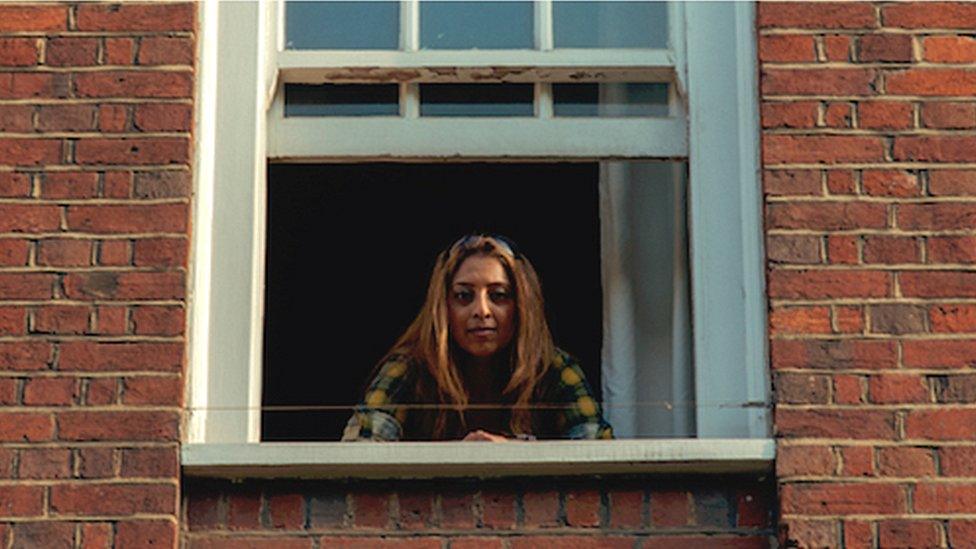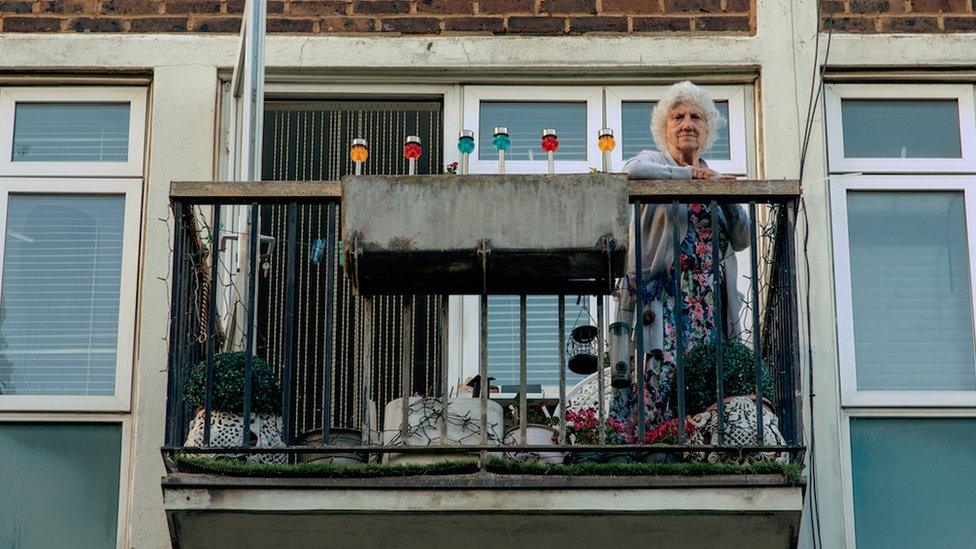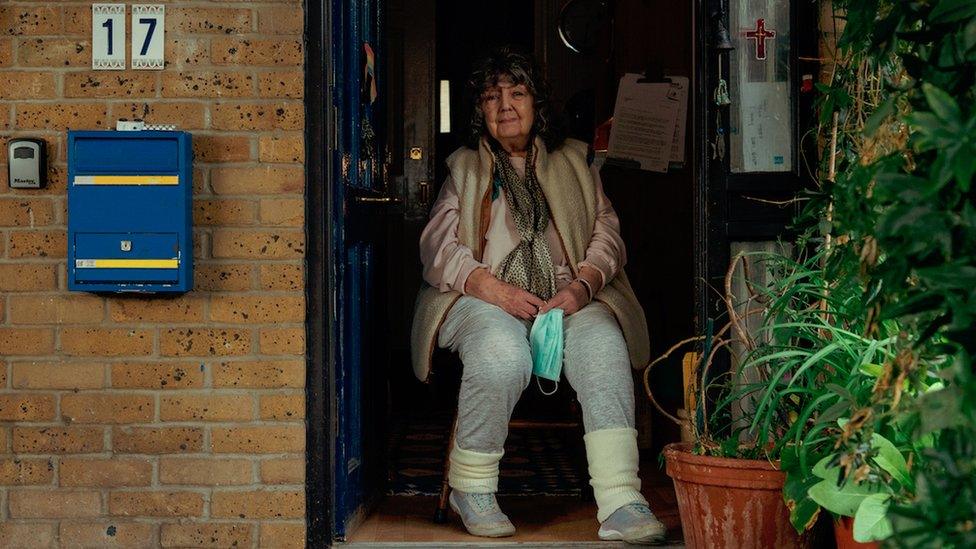Lockdown loneliness reaches record levels
- Published

Adam Isfendiyar's online photo exhibition in the Being Human Festival records how people have coped in lockdown
The week after the clocks went back saw Britain's highest levels of acute loneliness in the pandemic, Office for National Statistics figures suggest.
The start of November, with darker evenings, saw 8% of adults who were "always or often lonely" - representing 4.2 million people.
This was the peak in this measure of loneliness since the lockdown in March.
Loneliness Minister Baroness Barran says the next few months will be "incredibly challenging".

An online photo exhibition shows people in East London who faced isolation during the pandemic
Figures also show that 5% of adults - representing 2.6 million people - had not left their home for any reason in the previous seven days.
Psychologist Vivian Hill says the "descent into winter" can be a "very significant factor" in how people feel about loneliness, with less daylight and colder weather reducing the opportunity to get outside.


Beating loneliness
Millions of people, young and old, are facing loneliness, isolation and separation during the lockdown. A BBC News project, on TV, radio and online, reveals some of their stories and how they are fighting back.
Beating loneliness
Millions of people, young and old, are facing loneliness, isolation and separation during the lockdown. A BBC News project on TV, radio and online reveals some of their stories and how they are fighting back.
Gaming and friendship apps: How young people are tackling loneliness
Five voices from the lockdown: 'Only left home three times since March'
Make connections through BBC Local Radio's Make a Difference campaign
If you or someone you know is affected by any of the issues raised, BBC Action Line has a list of organisations and charities offering advice and support

The Office for National Statistics (ONS) research has seen levels of loneliness fluctuating during the pandemic - with a broader measure, including those "sometimes" lonely, showing about one in four adults experiencing loneliness.
But in the week up to 1 November the measure of more acute loneliness - those "always or often" lonely - reached 8%, the highest it has been since the start of the pandemic, and representing 4.2 million people.
Pre-pandemic surveys showed about 5% of adults "always or often" lonely - or about 2.6 million people.
Marjorie Wells, 91, gives her advice on fighting loneliness
The research shows that young people are particularly likely to feel cut off - with 16 to 29-year-olds twice as likely as the over-70s to be experiencing loneliness in the pandemic.
Elorm Fiavor from Salford, a young carer looking after her mother who is shielding, said there needed to more recognition of the pressures of loneliness on young people.
"It needs to be OK to talk about it," says the 16-year-old, who misses being able to go out with friends and socialising and who is helping a charity, Lonely Not Alone, which tackles isolation among the young.
"There's a lot of stigma attached to it.
"There's a great misconception that when people think of loneliness they only think of older people who are living alone."

Elorm says that there is a misconception that loneliness is only a problem for older people
Student Jade Low says he has missed partying and socialising in the pandemic - but the challenge is to "punch through" and find ways to keep in touch and stay motivated.
"Everyone feels lonely sometimes," says the student at Imperial College London - and to keep himself busy he has taught himself to play the ukulele.
The figures from the ONS show about one in four people experiencing some form of loneliness at the start of November.
Dr Vivian Hill, who is the British Psychological Society's lead on isolation in the pandemic, says loneliness is a serious problem - and could be made more difficult in winter.

Staying in touch with neighbours or making a phone call can help to tackle loneliness
But she says it is something that can be tackled and people should be optimistic about being able to make connections and reduce loneliness.
Baroness Barran says there are new groups facing loneliness in the pandemic - such as those without internet access and those working from home who would usually rely on workplaces for their social lives.
The loneliness minister said there was funding for grassroots community projects to help people stay in touch.
But she said it was important not to underestimate the impact of things individuals could do - such as ringing someone up, writing a letter or helping a neighbour.
"It's those simple things that make people feel valued," she said.
Photos by Adam Isfendiyar are from an exhibition recording the pandemic in East London, being shown in the Being Human festival of the humanities, external. Due to the lockdown, the exhibition has been moved online, external.

Have you been experiencing loneliness since the recent lockdown measures were enforced? Email haveyoursay@bbc.co.uk, external.
Please include a contact number if you are willing to speak to a BBC journalist. You can also get in touch in the following ways:
WhatsApp: +44 7756 165803
Tweet: @BBC_HaveYourSay, external
Please read our terms & conditions and privacy policy
If you are reading this page and can't see the form you will need to visit the mobile version of the BBC website to submit your question or comment or you can email us at HaveYourSay@bbc.co.uk, external. Please include your name, age and location with any submission.